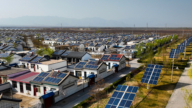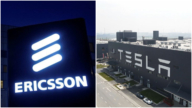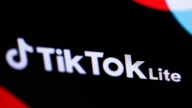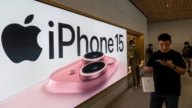【新唐人2013年05月11日訊】日前,大陸官方媒體撰文,聲稱國資委研究專家指出,任何一家「央企」都不是壟斷企業,中國的「國企」做大,有利於國際競爭,國營企業關係到國家的戰略利益和安全,硬性要求國有企業全面退出競爭性領域,會影響中國的產業發展和經濟安全。那麼中國的國營企業是否真的存在壟斷?正常社會裏存在大量國營企業嗎?他們的國營企業是為了保障民眾的利益,還是在和民間企業爭利呢?世界上戰略強國和經濟強國是靠國營企業做起來的嗎?我們一起來看看專家怎麼說的。
國資委研究中心研究部部長許保利對記者表示,國有企業壟斷的說法並不符合實際。即使在一些普遍被認為壟斷程度較高的行業中,不同企業之間的競爭,包括競爭激烈的國際市場,並沒有哪一家企業能夠在市場上真正占有壟斷優勢。
大陸企業觀察員何軍樵:「他是說給自己聽的,至於別人聽不聽﹖他不在乎。現在國營企業成了國中之國,實際上他們是不是企業家?不是嗎!他們是有一定級別的官員對不對?至於中國的壟斷企業為甚麼能夠成為世界五百強?那就是壟斷的原因在裡面。每年的補貼不計其數,絕大一部分貸款都帶給了國企。稅收,沒有。」
許保利還說,國家對石油這類高度稀缺性,或涉及國家安全的戰略性部門,採取壟斷性經營是必要的。這個壟斷地位是國家給予的,並不是企業自己定的。
美國南卡羅萊納大學艾肯商學院教授謝田:「實際上,政府的作用應該是打破壟斷,然後維持私人企業之間的競爭,以不侵害消費者的利益,而不是去扶持企業。人們都說美國國家實力強,美國經濟實力強。但實際上,美國經濟很強的大企業其實都是私有的,或者通過股份所有制全民共有的,都不是政府擁有的。」
世界前50強的石油公司中,美國有9家,他們都是股份公司,任何人都可以去購買股票。當年,美國老字號的老資本家標準石油公司,因為太發達、太壟斷,美國政府強行把他分解掉,美國電話電報公司,原來的「貝爾公司」也是如此。
謝田指出,中國的鐵路、電信、郵政、水電、航空等民生行業,就是因為政府壟斷,導致中國老百姓在這些服務上的付出,費用高於世界上其他國家多得多。
謝田:「我們知道正常國家很少有國有企業,就是有,他有壟斷地位的時候,利益是受到限制的,幾乎沒有利潤。比方說印度的鐵路,它也是壟斷,他幾乎是沒有利潤,他就是有利潤也是用低票降薪,返回給老百姓。」
許保利還強調,打破行政壟斷,必須要確保國家安全和產業安全。在涉及國家安全和國民經濟命脈的行業,國企的重要性無可替代。
謝田:「中共的官員認為,只有政府擁有的才是國家的實力。不把民運企業、私人企業當人看。實際上中共不光奪取了政權,經濟權、軍事權鬥不都牢牢抓在手中。這就是中國老百姓為甚麼沒有自由,沒有政治自由、沒有經濟自由,就是這個原因。」
謝田還指出,美國的軍工生產實際上也是私人企業在運作,美國國防部讓這些私人企業去競爭,看誰製造出來的戰鬥機好,誰能滿足國防部的要求,然後他才採購。
文章中還說,中國對電信產業實行了改革重組,並且已然由一家獨大的狀況變為了3家。
不過謝田指出,實際上這三家都是國營企業,好像是在競爭,實際上是假競爭,因為三家企業的老闆都是國資委、都是中共既得利益集團。謝田還指出,任何國家的國營企業都是效率最低的。
採訪編輯/劉惠 後製/李勇
Is monopoly of state-owned companies real in China?
Recently, China’s official media quoted experts of State-owned
Assets Supervision and Administration Commission (SASAC).
They said central state-owned Corporations are not monopolies.
The expert claimed that, developing state-owned
Corporations s good for international competition;
They are also important to China’s strategic benefit
and national security;
Forcing them to retreat from competitive fields will
negatively affect China’s industry and economy.
Is there monopoly by China’s state-owned companies?
Are there many state-owned companies
in non-socialist countries?
If there are, do they protect civil interests or
compete with private companies?
Is there any great power that relies on state-owned
companies to develop its country?
Several experts will provide their answers to these questions.
Xu Baoli, a department head at SASAC denied China’s state-
owned companies are monopolies when interviewed.
Xu said, even if it looks like it, almost no company can really
corner the market due to intense competition especially globally.
He Junqiao, Chinese market observer: ”He (the expert) is
talking to himself and doesn’t care about others’ opinions.
Now state-owned companies have become states
within our state.
Are their leaders real entrepreneurs? No, they are not.
They are all party officials of some certain levels, right?
Then how can they become top 500 enterprises?
The answer is monopoly.
They are given numerous subsidies and receive most of
the loans. On the other hand, they almost pay no tax at all.”
In his interview, Xu Baoli also said it is necessary for the
government to monopolize resources.
The ones that are highly scarce or relate to
national security, as well as the oil dept.
The monopoly is therefore a governmental decision,
not by the state-owned company itself.
Xie Tian, Professor at University of South Carolina:
”The role of government should be restraining monopoly.
By encouraging competitions between private enterprises,
it will protect the consumers.
It should not support any one company. Everyone says that
the United States has a very strong economic power.
However, American giant companies are either private ones
or owned by all the people through stock ownership.
They are not owned by the government.”
Among the top 50 oil companies in the world,
nine belong to the United States.
They are all stock corporations and anyone can
purchase their stocks.
In the past, the famous Standard Oil was dissolved by
the US government because it was too powerful and
the degree of monopoly was too high.
The former “Bell system” was also forcefully
broken up for the same reason.
Xie Tian remarked that, China’s railroad, telecom,
post service, water and power supply, aviation and
other industries most relevant to people』s livelihood
are all monopolized by the government.
Therefore the Chinese have to pay much more than
in most countries for those services.
Xie Tian: ”We know that in normal (non-socialist) countries
there are very few state-owned companies.
If there are, they are restricted to make almost zero profit
if monopoly exists.
For example, India’s railroad which is run by
the government has no profit.
If there is, the money will be returned to the Indians
by reducing the ticket prices.”
Xu Baoli also stressed that breakup of monopoly
has to yield to national and industrial security;
In fields that relate to national security or economic lifeline,
the importance of state-owned companies is irreplaceable.
Xie Tian: ”The Chinese Communist Party (CCP) officials believe
that national power only counts what the government owns.
They never treat private enterprises with fairness in the least.
In fact, the party not only holds the political power,
they also have the economic and military power.
This is why Chinese people have no freedom
politically or economically.”
Xie Tian remarked that, in US even war production
is run by private enterprises.
The Ministry of Defense encourages private companies
to compete with each other.
It will purchase from those who have the best product quality
that satisfies all its requirements.
The CCP sanctioned report also mentioned
the restructuring of China’s telecom industry;
Saying that now there are three service providers
compared to only one previously.
Xie Tian argued against the report that, in fact all three
telecom companies are state-owned ones;
The “competition” between them are not real
because they are all subject to SASAC, and are all part of the CCP’s interest groups.
Xie Tian further added that, in any country state-owned
companies always have the lowest working efficiency.





























